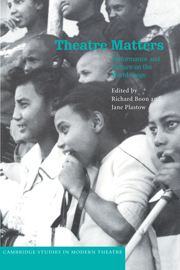Book contents
- Frontmatter
- Contents
- Notes on contributors
- Foreword: A letter from Kingston
- Preface
- Acknowledgements
- 1 Introduction
- 2 ‘The Revolution as Muse’: drama as surreptitious insurrection in a post-colonial, military state
- 3 Making theatre for a change: two plays of the Eritrean liberation struggle
- 4 Race matters in South African theatre
- 5 Dreams of violence: moving beyond colonialism in Canadian and Caribbean drama
- 6 The French-speaking Caribbean: journeying from the native land
- 7 ‘Binglishing’ the stage: a generation of Asian theatre in England
- 8 Popular theatre for the building of social awareness: the Indian experience
- 9 The promise of performance: True Love/Real Love
- 10 Making America or making revolution: the theatre of Ricardo Halac in Argentina
- Index
Preface
Published online by Cambridge University Press: 25 October 2009
- Frontmatter
- Contents
- Notes on contributors
- Foreword: A letter from Kingston
- Preface
- Acknowledgements
- 1 Introduction
- 2 ‘The Revolution as Muse’: drama as surreptitious insurrection in a post-colonial, military state
- 3 Making theatre for a change: two plays of the Eritrean liberation struggle
- 4 Race matters in South African theatre
- 5 Dreams of violence: moving beyond colonialism in Canadian and Caribbean drama
- 6 The French-speaking Caribbean: journeying from the native land
- 7 ‘Binglishing’ the stage: a generation of Asian theatre in England
- 8 Popular theatre for the building of social awareness: the Indian experience
- 9 The promise of performance: True Love/Real Love
- 10 Making America or making revolution: the theatre of Ricardo Halac in Argentina
- Index
Summary
The origins of this book lie in the determination of its editors and their colleagues to mark the retirement in 1998 of Martin Banham as Professor of Drama and Theatre Studies and Director of The Workshop Theatre at the University of Leeds.
A festschrift was an obvious way of allowing some, at least, of Martin's many friends and colleagues the opportunity of honouring his achievement as teacher, scholar and academic. What was less immediately clear was the precise form such a book might take. It is a testament to the breadth of Martin's interests and expertise that this collection of essays could quite easily have concerned itself with the history of British theatre, or with Shakespeare, or Victorian melodrama (especially or even only Tom Taylor!); with designing for the stage, or with part or the whole of that great range of educational and developmental uses to which drama and the theatre have been put. All would have been both appropriate and legitimate. In reality, however, our choice of subject was a simple one. Since he began his academic career in the 1950s at the University of Ibadan (a time fondly recollected by Wole Soyinka in his Foreword), a large part of Martin's heart has belonged to the theatre of Nigeria. Indeed, the importance of his influence on the creation of the modern theatre of that troubled country has long been recognised. (Only recently, Martin was greatly embarrassed, on meeting a young theatre director who had just returned from a visit to West Africa, to be greeted by ‘Martin Banham? You're a legend!’.)
- Type
- Chapter
- Information
- Theatre MattersPerformance and Culture on the World Stage, pp. xix - xxiPublisher: Cambridge University PressPrint publication year: 1998

